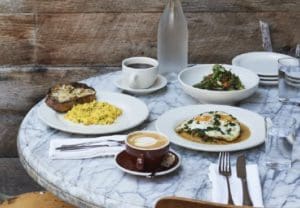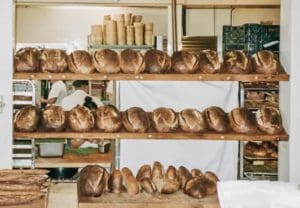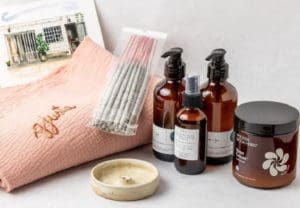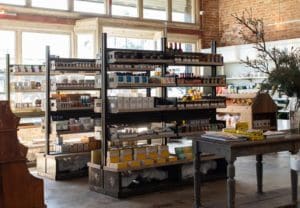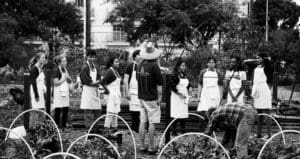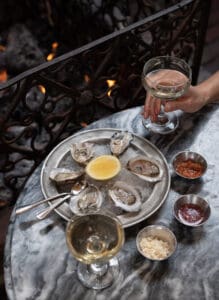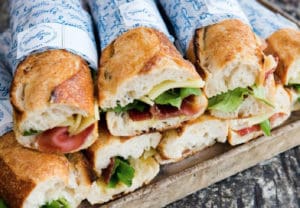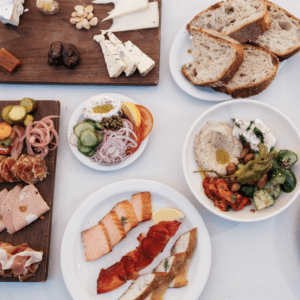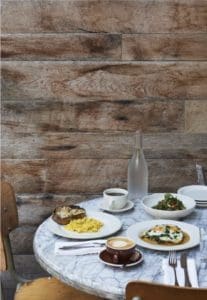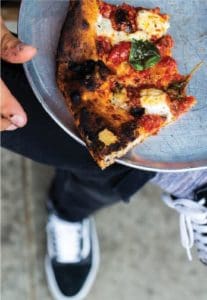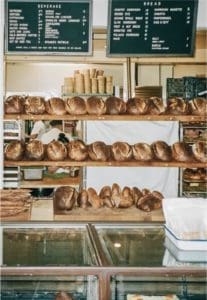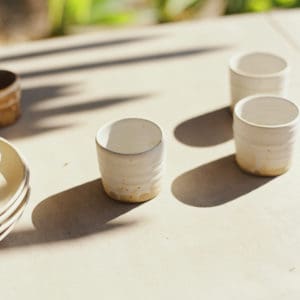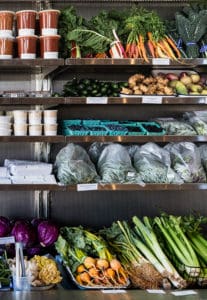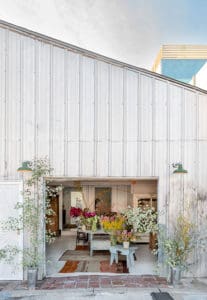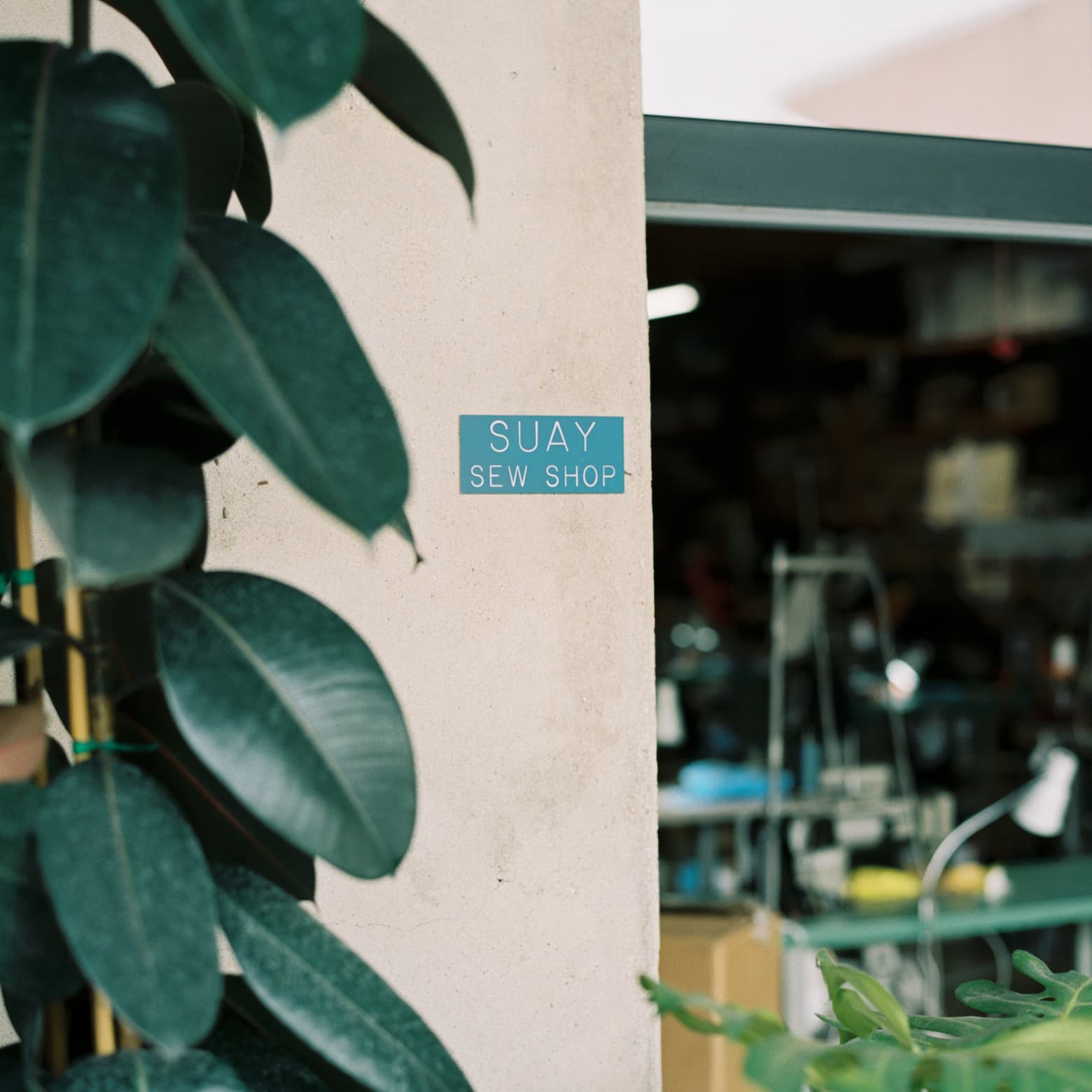
Conversations: Suay Sew Shop
A conversation with friend and longtime Gjusta Goods collaborator Lindsay Medoff, founder of Suay Sew Shop. Suay is a collective of highly-skilled sewers breathing new life into reclaimed garments and textiles — and we’re lucky to be able to work with them on the creation of many of our favorite Gjusta Goods pieces, like the 100% linen napkins, pillows, tablecloths, aprons, and beeswax bread bags.
We have always been inspired by the careful thought, value system, and deep consideration that informs everything Lindsay (and Suay) creates — Suay’s business is completely vertical, with all goods produced in house. A highly-discerning approach to development and design guides their work, holistically considering what it actually means to bring new products into the world, and how that can be done in the most conscious way possible, from materials to labor to distribution. The end results are beautiful handmade pieces, produced with utter care, created from fabrics that would have otherwise been waste.
In addition, Lindsay is a fierce advocate for the rights of garment workers in Los Angeles and beyond, fighting for access to fair pay and resources, as well as revealing many of the inequalities that are unspoken industry standards. Read on for our conversation with Lindsay, touching on Suay’s current and ongoing endeavors; how to use our attention differently; and the trickle-down effect of how awakening to more conscious consumerism can have wide-reaching positive impacts.
Photos by Justin Chung




How has SUAY evolved over the years? What are you moving forward closer towards? And away from?
Suay has been a 20 year project thus far and will continue to be my life’s work, in service to others and the planet. Suay started from thrifting in 7th grade to being a radical model for change and community building. Suay will keep evolving to meet the needs of the wild world we are living in, continually dedicated to positive change. It’s not about being a brand, it’s about creating a movement.

You speak of sewing – the art and the skill of it – as the conduit by which your materials are repurposed. For those looking for their own ways to up-cycle, can you share a few tips or skill-building resources?
The thought process of not having sentimental attachment to material objects, desperately needs to shift. We have now misused precious natural resources, polluted our planet, and allowed massive labor abuse to create textiles we aren’t even committed to long term.
Adopting an awareness of what it took to be able to hold that clothing item in your hand/on your body is STEP ONE. Yes learn to mend, yes learn to turn an old sweater into a pillow, yes get into patchwork, but if you aren’t doing the above we aren’t going to create the legitimate habitual shift to make any difference proportional to the problems we have on our hands.
What do you understand right now as the highest priority in advancing awareness of such a visibly saturated and opaque commodity chain?
We are drowning in “stories” of ethicacy and sustainability, from large corporations changing their language to new independent brands popping up every week, telling us that buying this jacket or jumpsuit is going to save the planet.
No business is going to save us or our beautiful planet. Very few of these businesses actually OWN the factories they produce in. This is why Suay’s model is so crucial. We are completely vertical, producing everything in house, setting progressive, effective standards actually proving that it works. It’s a commitment to the planet and the people over stale ideas of what margins should be for business owners. If we still have clean water or clean air in 10 years it will be because we changed our habits, opened our eyes, and got as uncomfortable as our world is right now.

The SB 1399 bill looks to expand the definition of garment manufacturing – and garment workers’ rights – in California. Can you tell us more about the initiative and why it’s important to align your value system with policy change?
What SB 1399 stands for is baseline human respect. Why is the skilled laborer so undervalued in fashion? Because we have allowed them to be. Piecework is an inhumane model. Imagine your entire livelihood, whether you had enough to eat or money to pay your rent was contingent upon how fast your hands moved, instead of the combined skill your experience had to offer?
The “hyped” Made in LA story comes with many injustices. Consumers are being misled with the twisted narrative on the health, safety and compensation of our state’s garment workers. Conscious consumers feel as if sweatshops conditions are not alive and well in LA. This is where it becomes incredibly dangerous as a critical wage injustice and human rights violation. I urge anyone reading this to tap into the Garment Worker Center here in Los Angeles and support them in every step of the way of getting BILL SB 1399 passed. Suay is in full support!

Burgeoning food movements have helped popularize the value and benefits of consuming sustainably grown food. But as you’ve highlight through your initiative “Know Your Grower, Know Your Sew-er,” we’re still experiencing a cognitive and emotional dissonance about our clothing supply. How can responsible education change this?
Food inequality is rampant. Part of Suay’s focus has shifted to creating awareness of unequal food quality amongst the “so called” ranks in fashion. Historically, garment workers have not been championed or compensated fairly. Why are there fancy dinners and large tab food orders at meetings for fashions considered elite (designers, models, magazine employees, business owners) yet the hard working skilled artisans actually producing the clothing don’t have access on the same level? Do they not also work in the opulent world of fashion? Why would they not have access to the same quality of food? And how has fashion contributed to that being “luxury” instead of a shared basic human right? In fashion it’s very much tied into how we establish value in skill within our industry.
Currently with Suay’s food distribution and CSA we are feeding 200+ garment worker families each week. Residents of Los Angeles can buy a CSA box for their family and in turn one box will be donated to a garment worker family. If you don’t live in LA, you can also donate a box from afar. Honestly, it’s been powerful to witness community folks stepping up and buying a box, showing their recognition of garment workers. Click here to learn more, buy or donate a farm box!
Interesting enough so little of our current membership actually works in fashion. It speaks to how deeply our industry lacks awareness and then subsequently takes action to create visibility and advocacy for garment workers. Will this fix all the injustices? No. But every week we feed garment workers, we build on their jobs holding value to our community, we create visibility to their struggles, we let them know they are seen, and we keep growing an army of activists for skilled labor deserving the same respect as a designer receives.

How else can we get involved — can folks donate pieces to you directly?
Suay just launched a donation program! We have been building the infrastructure for the last year to be able to take back textiles on scale. You can drop off directly at the SUAY sewing shop/store in LA or mail in. A SUAY textile donation box is even in the works at Gjusta Goods, so stay tuned for that amazingness! We will use our local and global community seconds and unrepairable items to create post consumer home goods and clothing, durable and desirable enough for an entire second life. Remade everything is the future, but the exciting news is…it’s already here.
Who, what, where, how should we be paying attention differently right now?
The main person you should be paying attention to is yourself. Become your own everyday sustainable, ethical hero. Observe your own habits that could be creating weight on our already overloaded ecosystems. Set an example to your family and friends. Ask more of yourself. Get uncomfortable, embrace radical change, demand equality, transparency, and ethicacy. Be an advocate. Show up. Again, no corporation or brand will save us, but good old grassroots activism just might.
Subscribe To Our Newsletter
Receive updates on new menu items, recipes, stories, and updates from the Gjelina Group.
